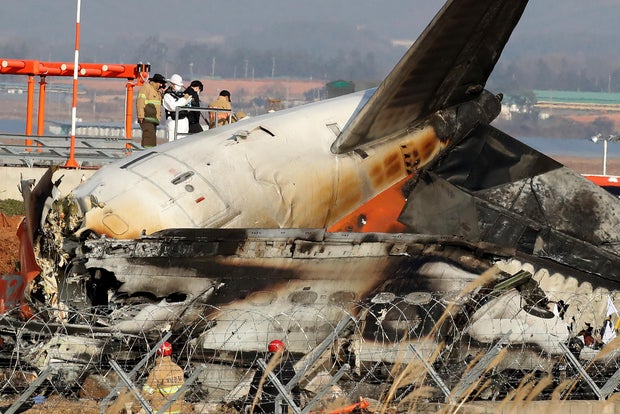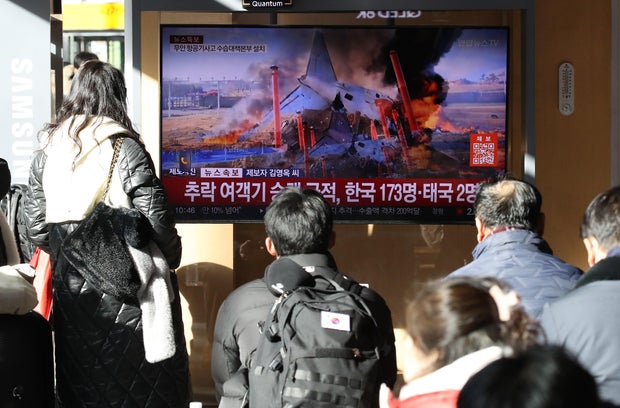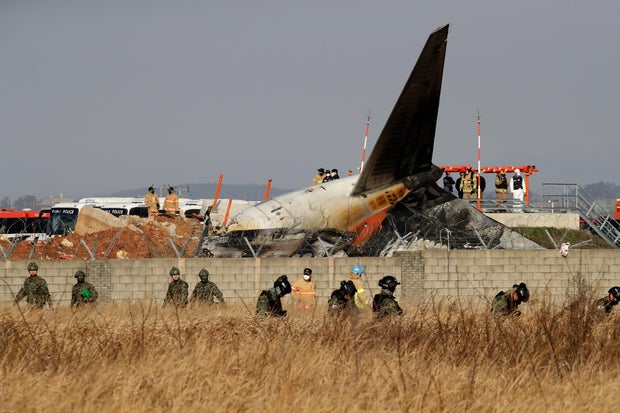South Korean officials have vowed to find out the reason A Jeju Air Boeing 737-800 passenger plane crashed in flames while attempting to land over the weekend, all but two of the 181 people on board were killed. A day after the crash, there were far more questions than answers about the nation's worst aviation disaster in decades.
Authorities ordered an immediate inspection of all 737-800 planes operated by the country's airlines — dozens of planes in all — after the crash, but there was still no clear indication whether a system failure, human error or some combination of factors caused the crash.
Here's an overview of what is known about the Jeju Air plane crash, as well as some key questions that have emerged since the tragedy.
What happened in the South Korean plane crash?
Jeju Air Flight 7C 2216 departed from Bangkok, Thailand and was scheduled to land at Muan International Airport in southern South Korea on Sunday.
After an initial failed landing attempt, the Boeing 737-800 received a bird strike alert from ground control. He then rose again before attempting to land a second time.
Two minutes later, the plane's crew gave a distress signal and tried to land on another runway. Three minutes later, the plane landed without lowering the nose landing gear.
It skidded down the runway at high speed, crossed the end of the runway and crashed into a concrete fence, exploding into a fireball. The only survivors were two crew members rescued from the tail section.
Chung Sung-Jun / Getty Images
Observers say videos of the crash suggest the plane may have had engine trouble, but landing gear failure was likely the main cause of the crash.
South Korea's transport ministry said the plane's flight data and cockpit voice recorders — so-called “black boxes” — were taken to a research center at Gimpo International Airport in Seoul before being analyzed. Earlier, the ministry said that the investigation of the disaster will take several months.
Getty Images
Jeju Air said the crash was not due to “any maintenance issues,” according to South Korean news agency Yonhap and aviation expert Jeffrey Thomas. told BBC News that South Korean airlines are generally considered to follow “industry best practices” and that both the plane and Jeju Air had an “excellent safety record.”
The South Korean plane crashed into the fence that shields the antennas
Transportation Department officials said Monday they were looking into whether the fence the plane crashed into — a concrete structure that housed a set of antennas designed to guide the plane safely during landing — should have been made of lighter materials that break more easily on impact. They said they were also trying to find out if there was any communication problem between air traffic controllers and the pilot.
The location of the localizer antennas near the end of the runway behind the unforgiving fortifications is likely to be the focus of investigators.
Chung Sung-Jun/Getty Images
“Usually at an airport with a runway at the end, you don't have a wall,” Christian Beckert, a flight safety expert and pilot for German airline Lufthansa, told Reuters. “You can more (more often) have a special material retention system that allows the plane to sink a little bit into the ground” to slow it down.
Could a bird collision have caused the Jeju Air crash?
Lee Jeong-hyun, chief of the Muang local fire department, said on Sunday that a bird strike and bad weather may have contributed to the crash, but he stressed that the cause was still under investigation.
According to CBS News affiliate BBC News, one passenger on the flight texted a relative before the crash and said the bird was “stuck in the wing” and could not land, but officials have not yet confirmed whether it was bird strike.
Geoffrey Thomas, an expert quoted by the BBC and editor of Airline News, told Reuters separately that he was skeptical that a bird strike alone could have caused the fatal crash.
“Bird strikes are not unusual. Undercarriage problems are not unusual. Bird strikes are a lot more common, but they don't usually result in the death of an aircraft by themselves,” he said.
It remained unclear what engine or systems failures the crew may have experienced in the final minutes of the ill-fated flight. Experts said video of the crash showed no visible movement of the plane's flaps as it fell, which could have helped slow the plane, suggesting there may have been a loss of hydraulic pressure that controls mechanical devices.
The hydraulic control systems operate independently, and experts say the engine problem is unlikely to affect their operation.
The aircraft also has a manual override for pilots to lower the landing gear in the event of an electronic or mechanical failure. It was unclear if the Jeju Air crew simply did not have time to manually lower the nose wheels, or if some other factor could have prevented them from doing so.
A long and difficult year for the American aircraft giant Boeing
The crash capped a troubling 2024 for US aviation giant Boeing, which has faced security issuesa machinists are on strike and falling stock prices.
Experts say the 737-800 is a more proven model than the company's much-maligned 737 Max airliners. associated with fatal accidents in 2018 and 2019.
However, South Korean authorities said they would conduct safety checks on all 737-800 aircraft operated by domestic airlines, including Jeju Air's 39 aircraft.
contributed to this report.



